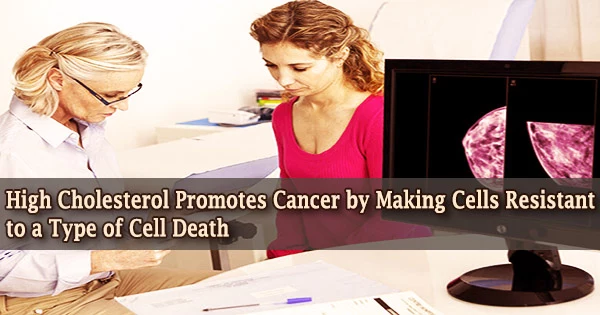Chronically high cholesterol levels have been linked to an increased risk of breast cancer and poorer outcomes in most malignancies, but the exact mechanism is unknown.
A research team led by the Duke Cancer Institute has identified the mechanisms at work in a study published online August 24, 2021, in the journal Nature Communications, describing how breast cancer cells use cholesterol to develop stress tolerance, making them impervious to death as they migrate away from the original tumor site.
“Most cancer cells die as they try to metastasize it’s a very stressful process,” said senior author Donald P. McDonnell, Ph.D., professor in the departments of Pharmacology and Cancer Biology and Medicine at Duke University School of Medicine.
“The few that don’t die have this ability to overcome the cell’s stress-induced death mechanism. We found that cholesterol was integral in fueling this ability.”
McDonnell and colleagues built on previous work in their lab that looked at the connection between high cholesterol and estrogen-positive breast and gynecological malignancies. Cancers driven by the estrogen hormone benefited from cholesterol compounds that function like estrogen, boosting cancer growth, according to those research.
However, a conundrum arose in the case of estrogen-negative breast tumors. Although these malignancies are not estrogen-dependent, elevated cholesterol is nevertheless linked to a worsening of disease, implying that a separate mechanism is at work.
Most cancer cells die as they try to metastasize it’s a very stressful process. The few that don’t die have this ability to overcome the cell’s stress-induced death mechanism. We found that cholesterol was integral in fueling this ability.
Donald P. McDonnell
The Duke researchers discovered that moving cancer cells consume cholesterol in reaction to stress in a recent study employing cancer cell lines and mice models. The majority of them perish.
However, in the what doesn’t kill you makes you stronger pattern, those who survive to get a superpower that allows them to withstand ferroptosis, a natural process in which stressed cells die. These stress-resistant cancer cells grow and spread quickly.
Other forms of cancers, including melanoma, appear to use the same pathway as ER-negative breast cancer cells. And treatments that target the discovered mechanisms could be developed.
“Unraveling this pathway has highlighted new approaches that may be useful for the treatment of advanced disease,” McDonnell said.
“There are contemporary therapies under development that inhibit the pathway we’ve described. Importantly, these findings yet again highlight why lowering cholesterol either using drugs or by dietary modification is a good idea for better health.”
Wen Liu, Rachid Safi, Dmitri Kazmi, Binita Chakraborty, and Ching-yi Chang are among the study’s authors, in addition to McDonnell. The National Institutes of Health and the Department of Defense Breast Cancer Research Program provided funding for the study.





